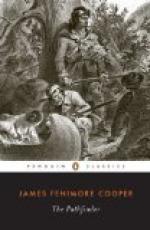The meeting between Pathfinder and Sanglier bore some resemblance to that celebrated interview between Wellington and Blucher which has been so often and graphically told. It took place at the fire; and the parties stood earnestly regarding each other for more than a minute without speaking. Each felt that in the other he saw a formidable foe; and each felt, while he ought to treat the other with the manly liberality due to a warrior, that there was little in common between them in the way of character as well as of interests. One served for money and preferment; the other, because his life had been cast in the wilderness, and the land of his birth needed his arm and experience. The desire of rising above his present situation never disturbed the tranquillity of Pathfinder; nor had he ever known an ambitious thought, as ambition usually betrays itself, until he became acquainted with Mabel. Since then, indeed, distrust of himself, reverence for her, and the wish to place her in a situation above that which he then filled, had caused him some uneasy moments; but the directness and simplicity of his character had early afforded the required relief; and he soon came to feel that the woman who would not hesitate to accept him for her husband would not scruple to share his fortunes, however humble. He respected Sanglier as a brave warrior; and he had far too much of that liberality which is the result of practical knowledge to believe half of what he had heard to his prejudice, for the most bigoted and illiberal on every subject are usually those who know nothing about it; but he could not approve of his selfishness, cold-blooded calculations, and least of all of the manner in which he forgot his “white gifts,” to adopt those that were purely “red.” On the other hand, Pathfinder was a riddle to Captain Sanglier. The latter could not comprehend the other’s motives; he had often heard of his disinterestedness, justice, and truth; and in several instances they had led him into grave errors, on that principle by which a frank and open-mouthed diplomatist is said to keep his secrets better than one that is close-mouthed and wily.
After the two heroes had gazed at each other in the manner mentioned, Monsieur Sanglier touched his cap; for the rudeness of a border life had not entirely destroyed the courtesy of manner he had acquired in youth, nor extinguished that appearance of bonhomie which seems inbred in a Frenchman.
“Monsieur le Pathfinder,” said he, with a very decided accent, though with a friendly smile, “un militaire honor le courage, et la loyaute. You speak Iroquois?”




